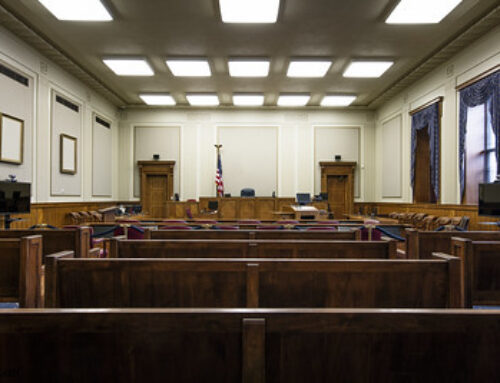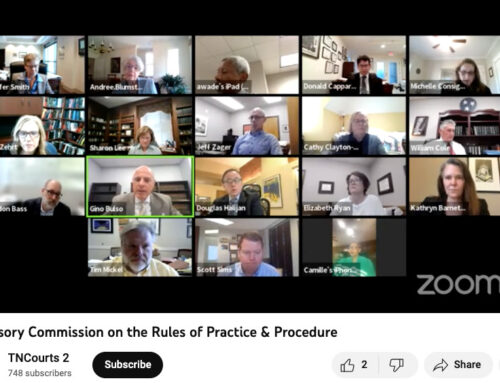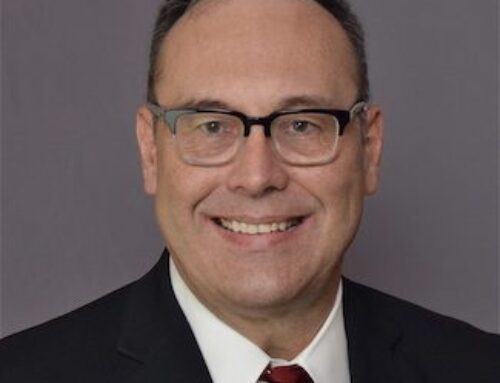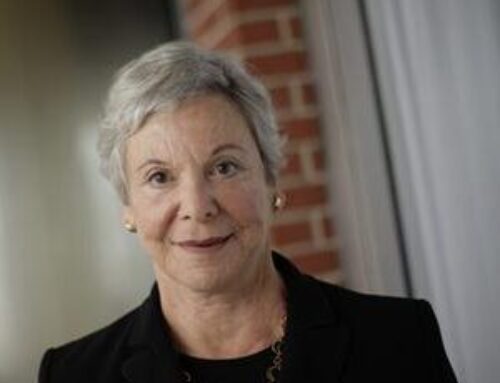Judge declines to issue order allowing press to cover Judicial Conference
A federal judge declined on Tuesday to issue from the bench a temporary restraining order requested by a media organization that wanted to cover the Tennessee Judicial Conference annual meeting after he got assurances in court from a deputy attorney general that the meeting was only an educational “CLE for judges.”
A national news organization that operates in Tennessee, The Center Square, argued that a new policy passed in February closing state judicial conferences to the press violates the First Amendment because it bars access to judicial proceedings.
The Tennessee Judicial Conference is an entity created by the General Assembly whose members include all state judges of courts of records, which includes chancery and circuit courts and appellate courts. It is required by statute to meet annually and has authority to consider matters related to “a more prompt and efficient administration of justice,” potential new laws and rules of procedure and rules of official conduct for judges.
Doughtery: Tennessee Judicial Conference meetings should be open
Buck Dougherty, an attorney with Liberty Justice Center, compared the Tennessee Judicial Conference to the U.S. Judicial Conference, which has open meetings when it carries out similar duties as outlined in statute for the Tennessee Judicial Conference. He argued that the First Amendment right of access to judicial proceedings extends to these meetings, such as is the experience with the U.S. Judicial Conference.
“Tennessee’s General Assembly enacted a statute in 1953 that requires Tennessee Judicial Conference members to meet annually and: (1) consider all matters to improve the efficient administration of justice in state courts; (2) consider laws and rules of procedure to suppress crime and promote peace and good order;(3) prescribe rules of official conduct for all judges; and (4) appoint committee members to draft legislation and make recommendations to submit to the General Assembly,” Doughtery said in his memorandum of law.
“This is not a continuing legal education retreat for members. Rather, the General Assembly enacted the Tennessee Judicial Conference statute through legislative action requiring its members to meet annually and deliberate on state court policy. The General Assembly prescribed on members similar duties to those Congress imposed on United States Judicial Conference members for overseeing federal court policy. As Tennessee Judicial Conference’s federal equivalent, the Judicial Conference of the United States has had an enduring and historical tradition for nearly 34 years of public access to committee meetings on proposed rules of practice, procedure, and evidence.”
He said the new policy is a “blanket closure” is search of a problem and was “promulgated by state administrative fiat, rewriting the Tennessee Judicial Conference statute and the Tennessee Open Meetings Act enacted by the General Assembly. It does not list specific findings. It fails to show a compelling state interest justifying closure. And it is not narrowly tailored to serve its claimed interest. Moreover, it imposes a gag order on members and administrative court office staff preventing disclosure of dates, physical location, virtual access link, speaker documents, or other materials related to Tennessee Judicial Conference meetings.”
Kleinfelter: Wednesday’s annual meeting includes only education sessions
Deputy Attorney General Janet Kleinfelter confirmed in the hearing in federal court that the meeting of the Tennessee Judicial Conference scheduled for Wednesday is the annual meeting required by statute. But she said the members will engage only in educational sessions and the election of officers.
U.S. District Judge Waverly Crenshaw, Jr., said a temporary restraining order would not be necessary if the Judicial Conference members would not be engaging on Wednesday in substantive discussions on rules of procedure or the other duties outlined in the statute — “if all they’re going to do is a CLE.”
He questioned Kleinfelter in several ways about what the Judicial Conference would be doing on Wednesday, going through each part of the statute about the Judicial Conference’s duties and powers, and asked to see an agenda. Kleinfelter agreed to submit the agenda under seal to the judge.
Kleinfelter said the Judicial Conference historically has educational sessions at its meetings. She said, as an example, she has given presentations to the state judges in the Judicial Conference in the past, including on the public records law and election law. (Kleinfelter is the lead attorney in the AG’s Office who defends state agencies that have been sued by citizens for violating the public records law, often arguing for a different interpretation of the law than the attorneys representing the citizens.)
Doughtery agreed that a temporary restraining order would not be necessary if the meeting was only continuing legal education (CLE) training for judges, but he pointed out that the state had not said that the Judicial Conference never engages in discussions about rules and legislation in its meetings, as authorized by statute. He said that his organization has learned of another judicial meeting to be held in October.
The Center Square, which focuses on state and local government news, would like to be able to assign a reporter to cover such discussions. Doughtery had asked the court for a temporary restraining order and a preliminary injunction and then a permanent injunction preventing the Tennessee Administrative Office of the Courts from enforcing its new policy.
Administrative Office: Policy meant to address safety concerns
Rachel Harmon, the deputy director and general counsel for the Administrative Office of the Courts (AOC), said in an affidavit that the annual Judicial Conference meeting in June is no different than those that the judges attend at other judicial conferences produced by the administrative office throughout the year, with the exception of having in June “bench-bar” opportunities with the Tennessee Bar Association who meets at the same time.
She said it only applies to education-centered gatherings of judges and court clerks. “The Policy does not state that it applies to meetings of any committees,” she said. In the state’s response brief, it pointed to the statute that said a committee of the Judicial Conference’s members were to be appointed make legislation recommendations and said no such decisions were made during the annual meeting of the Judicial Conference as a whole.
“[A]s indicated by the Policy, the purpose of the conference is for judicial education — one of the statutory duties of the Administrative Director of the AOC. Public access to judicial education conferences would be a hindrance to the AOC’s ability to provide a safe space for judicial education and would cause a chilling effect on the necessary discussions and open dialogue that occur among the judges during the educational sessions held during the conferences,” she said in the affidavit.
The policy was implemented to “expressly address safety and security concerns when the judges gather together for educational purposes,” Harmon said in an affidavit. “The policy was a reaction, in part, to a concerning disruption by several individuals at a conference in late 2021, and also, in part, to the increase in threats and acts of violence directed toward judges at the federal, state, and local levels.”
Crenshaw had asked if virtual access could be provided, a point brought up by Doughtery in his filings as another way to provide access. She said in her affidavit that while technology was used in the pandemic to allow virtual access to judicial conferences, “I do not know whether the hybrid nature of an in-person and virtual conference can continue post-pandemic with existing staff resources. Moreover, in some locations where conferences are held, there is insufficient internet connectivity and bandwidth to support virtual attendance.”
Crenshaw noted a few times during the hearing that he has attended educational conferences for judges in the jurisdiction of the 6th Circuit Court of Appeals and adequate security was provided by the U.S. Marshals Service and FBI.
Kleinfelter responded that while security is also provided for Tennessee judges, such as by TBI, the decision on how to best to address security concerns lies at the state level.
While the restraining order was not issued on Tuesday, Crenshaw noted that the lawsuit still exists and said Center Square will have a chance at discovery.






